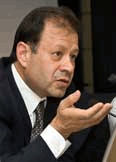World Bank trusts in Latin America's resilience, but "massive uncertainty" persists
Published on Fri, 2011-08-12 09:11
Sources: World Bank, Nicholas Bloom’s analysis, Andrew Jackson’s analysis, The Guardian, The Economist. Latin American economies have developed strong immune systems against global contagion but a worsening of the current market turmoil could put those defenses to the test, said World Bank Chief Economist for Latin America and the Caribbean, Augusto de la Torre. Other experts predicts times of extreme uncertainty. “Over the last 20 years the region has experienced a silent economic revolution that has provided a shield against external shocks, as we have witnessed in the previous crisis and those reforms are still in place,” de la Torre noted. But he warned that a worsening of the current turbulence -"a global turmoil of immense magnitude”, he said- could impact Latin America’s ability to grow. “Not even the best immune system in the world could withstand these kinds of attacks,” he noted. Such 'worsening' would materialize if rich economies –Europe, United States, the developed countries– dip into recession once again, de la Torre said. Under this scenario a US slowdown would have a larger impact on its close trade partners, including Mexico, the Caribbean and Central America. Economies linked to China –essentially those in South America– would sustain a lesser impact, provided the Asian giant continues its current high growth trend. But Nicholas Bloom, Assistant Professor of Economics at Stanford University, warned that “the US and European debt crisis of the last week have generated [a] massive economic uncertainty” that “has jumped to levels not seen since the crash of 2008”. “Stock market volatility is now so high that it’s reached the level that occurred right after the 9/11 terrorist attack – a period of incredible political and economy uncertainty,” Bloom wrote in an analysis published on European VoxEU portal. “Right now nobody knows what is going to happen next.” This week global markets experienced a confidence rollercoaster that wiped out more than US$3.8 trillion in investors’ holdings, forcing them to flee to safe havens such as Swiss francs, Japanese yen and gold. Latin American stock markets also zigzagged in this uncertainty, with their main indexes dropping an average of 7 to 8 percent, and then gaining around 5 percent in strong rallies. Global markets calmed somewhat after the US Federal Reserve’s decision to maintain a very low interest rate -near zero percent- for the next two years. Experts attribute the global market turmoil to a loss of investor confidence following the US credit rating downgrade and Europe’s financial woes. However, De la Torre is confident that, should a crisis develop, Latin America’s outlook will remain positive mirroring its resilience to the previous recession, when the region had a positive performance thanks to high commodity prices and its increasing trade with China. “Latin America could absorb the financial shocks from the global turmoil through greater exchange rate flexibility, maintaining reasonable growth rates,” he said. The World Bank’s most recent estimates suggest an annualized growth rate of around 4 percent for most regional economies, with the exception of the Caribbean. In the short term, the global economic outlook remains uncertain, the expert said. Calm would only return once investors feel again confident that rich countries –the US, Europe– have the capacity to implement public policies to confront their economic growth problems. Latin America’s governments seem to agree with De la Torre’s confidence. “This is the second time crisis affects the world, and for the second time Brazil isn’t trembling,” declared Dilma Rousseff, its president. “We are in a much stronger position to confront this crisis than we were at the beginning of 2009 and the end of 2008.” But Andrew Jackson, national director of Social and Economic Policy with the Canadian Labour Congress, warned that “temporary stimulus measures secured a temporary recovery, but at the cost of precipitating an unsustainable increase in public sector debt which now has to be unwound. That is likely to mean a very slow recovery or even worse, but further stimulus would make the underlying problem even worse. Hence we just have to reconcile ourselves to tough times,” Jackson wrote on the Canadian website The Progressive Economics Forum. The Chinese economist Sun Lijian wrote in a commentary for the People's Daily, according to The Guardian, that "the biggest victims” of the downgrade “may not be the United States itself, but other countries that have depended on external demand to amass national wealth – be they Asian nations that depend on exporting goods, or nations in Latin America and the Middle East, as well as Russia, that depend on exporting resources." » |




